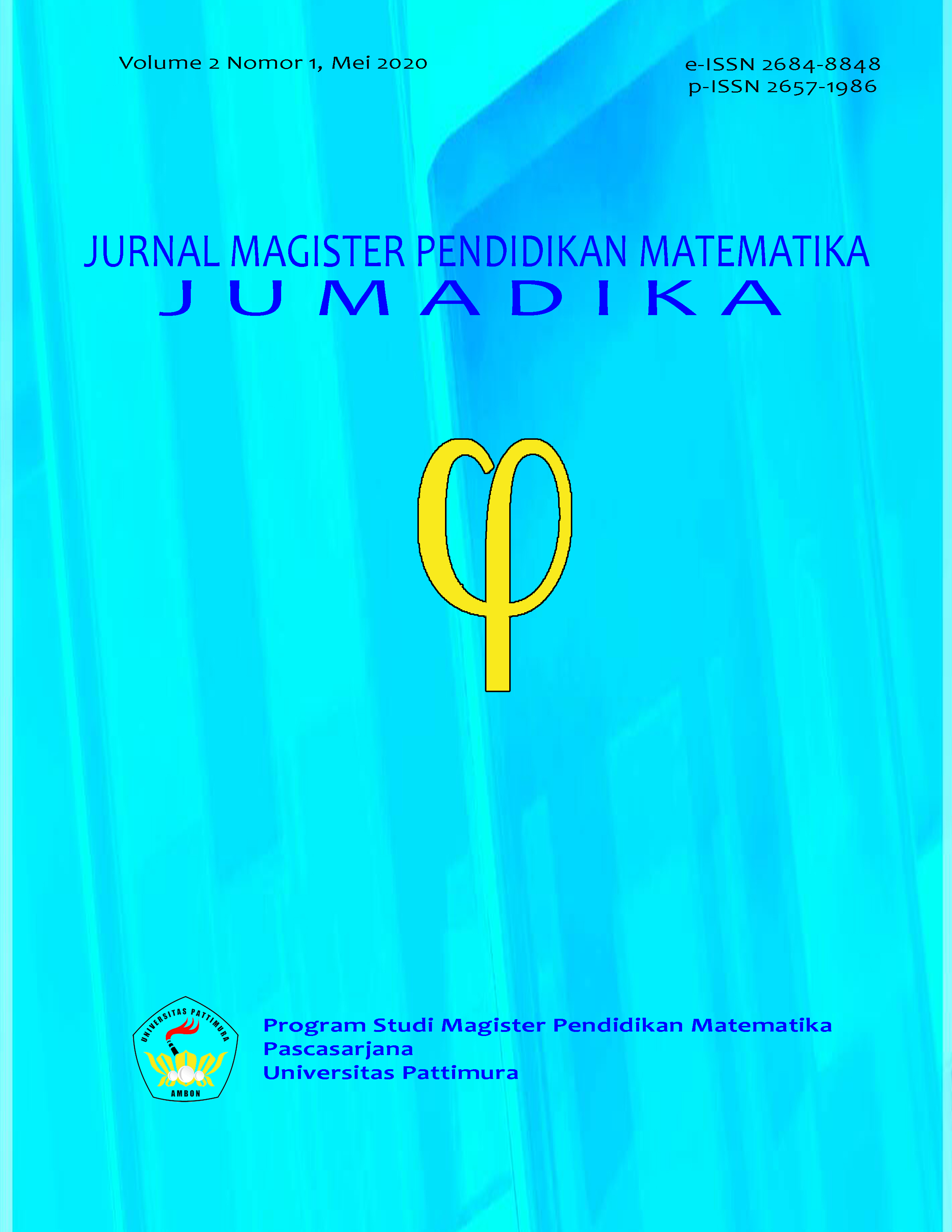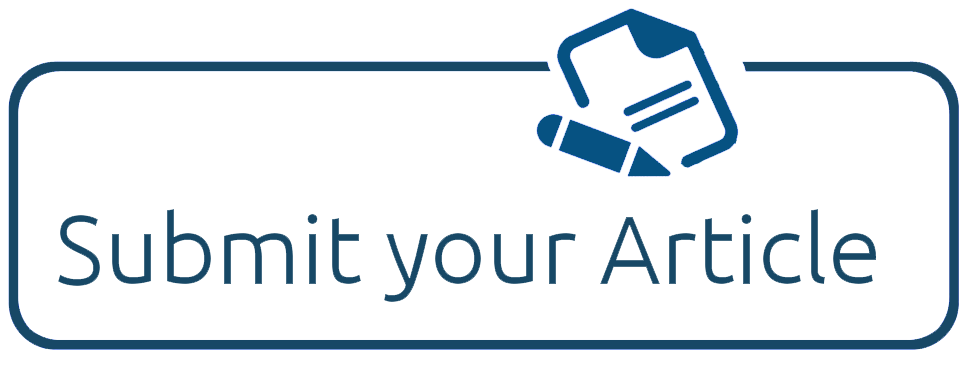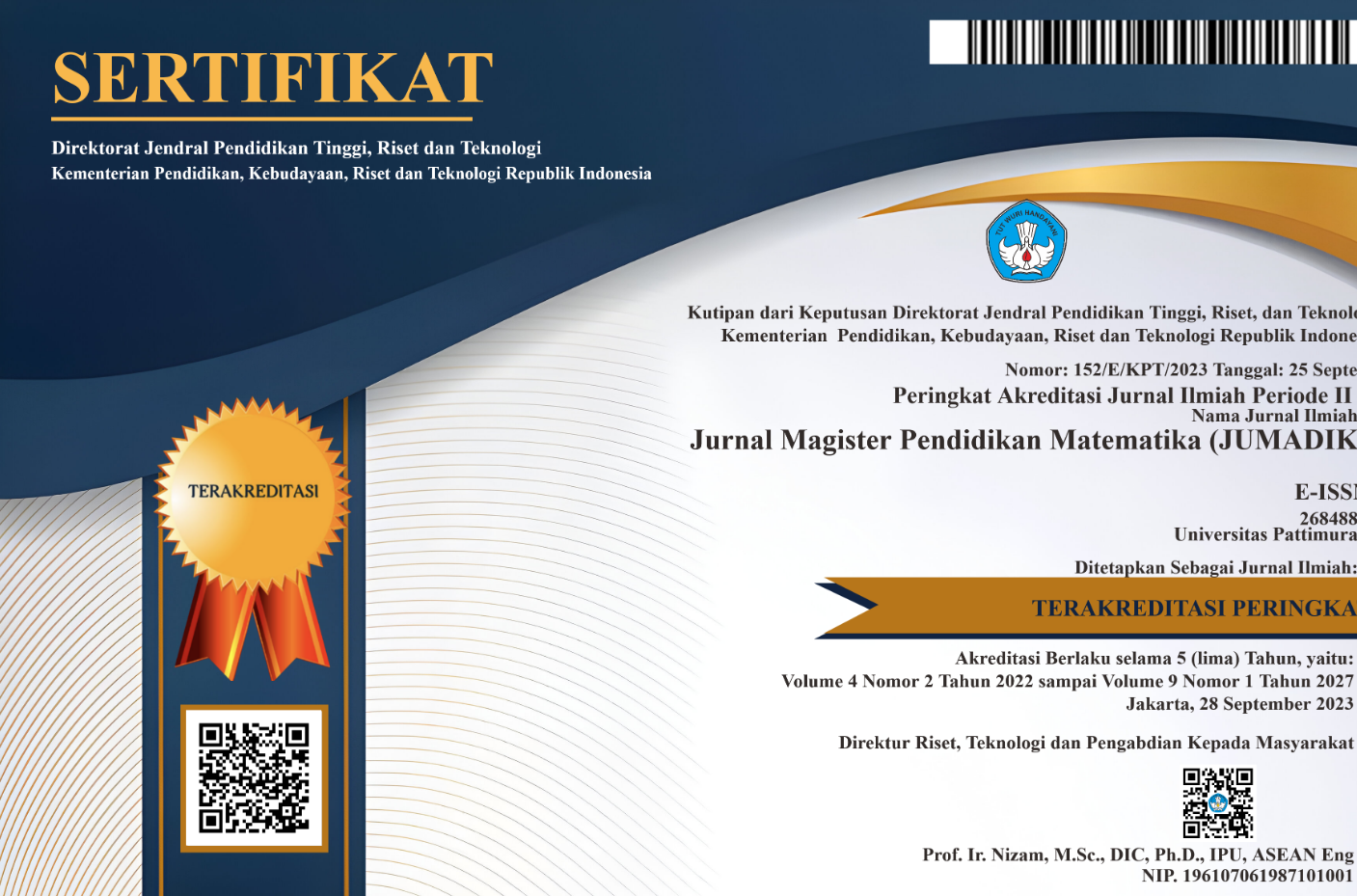PENERAPAN MODEL PEMBELAJARAN KOOPERATIF TIPE STUDENT TEAMS ACHIEVEMENT DIVISION (STAD) UNTUK MENINGKATKAN KEMAMPUAN PEMECAHAN MASALAH DAN PENALARAN MATEMATIS
Abstract
The mathematical problem solving ability is important for students to solve problems in mathematics learning. The purpose of this study was analyzed the difference in improvement of mathematical problem solving ability between students who use STAD type of cooperative learning model and direct teaching. This type research is experimental research with a quantitative appoarch. The subjects in this study were eighth-grade students of the SMP Kalam Kudus Ambon in the first semester of the 2019/2020 academic calendar, which consisted of two classes. Methods of data collection through an Initial Ability Mathematics test and a mathematical problem solving ability test. The result showed that there was a difference increase in ability of problem solving between students who obtain learning by using the STAD type cooperative learning models and direct teaching
Downloads
References
Depdiknas. (2006). Peremendiknas Nomor 22 Tahun 2006 Tentang Standar Isi Sekolah Menengah Pertama. Jakarta: Depdiknas.
Hendriana Heris, dkk. (2017). Hard Skills dan Soft Skills Matematik Siswa. Bandung: Revika Aditama.
Jamdin, A., Ratumanan, T., & Laamena, C. (2019). Pengembangan Perangkat Pembelajaran Berbasis Kooperatif Tipe STAD Pada Materi Perbandingan Untuk Siswa Kelas VII SMP IT Assalam Ambon. Jurnal Magister Pendidikan Matematika (JUMADIKA), 1(2), 81-90.
Muhsetyo, dkk. (2007). Pembelajaran Matematika SD. Jakarta: Universitas Terbuka.
Octizasari, G., & Haji, S. (2018). Penerapan Model Pembelajaran RME Berbasis Ethnomatematika Untuk Meningkatkan Kemampuan Pemecahan Masalah Mahasiswa Calon Guru Pendidikan Matematika FKIP Universitas Bengkulu. Jurnal Pendidikan Matematika (Jupitek), 1(1), 1-7.
Priansa, D. J. (2017). Pengembangan Strategi dan Model Pembelajaran. Bandung: Pustaka Set
Copyright (c) 2020 Chyntia Pasalbessy, Wilmintjie Mataheru, Carolina S Ayal

This work is licensed under a Creative Commons Attribution-NonCommercial-ShareAlike 4.0 International License.
License and Copyright Agreement
In submitting the manuscript to the journal, the authors certify that:
- They are authorized by their co-authors to enter into these arrangements.
- The work described has not been formally published before, except in the form of an abstract or as part of a published lecture, review, thesis, or overlay journal. Please also carefully read Jurnal Magister Pendidikan Matematika (JUMADIKA) Posting Your Article Policy.
- That it is not under consideration for publication elsewhere,
- That its publication has been approved by all the author(s) and by the responsible authorities – tacitly or explicitly – of the institutes where the work has been carried out.
- They secure the right to reproduce any material that has already been published or copyrighted elsewhere.
- They agree to the following license and copyright agreement.
Copyright
Authors who publish with Jurnal Magister Pendidikan Matematika (JUMADIKA) agree to the following terms:
- Authors retain copyright and grant the journal right of first publication with the work simultaneously licensed under a Creative Commons Attribution-NonCommercial-ShareAlike 4.0 International License (http://creativecommons.org/licenses/by-nc-sa/4.0/) that allows others to share the work with an acknowledgment of the work's authorship and initial publication in this journal.
- Authors are able to enter into separate, additional contractual arrangements for the non-exclusive distribution of the journal's published version of the work (e.g., post it to an institutional repository or publish it in a book), with an acknowledgment of its initial publication in this journal.
- Authors are permitted and encouraged to post their work online (e.g., in institutional repositories or on their website) prior to and during the submission process, as it can lead to productive exchanges, as well as earlier and greater citation of published work.








